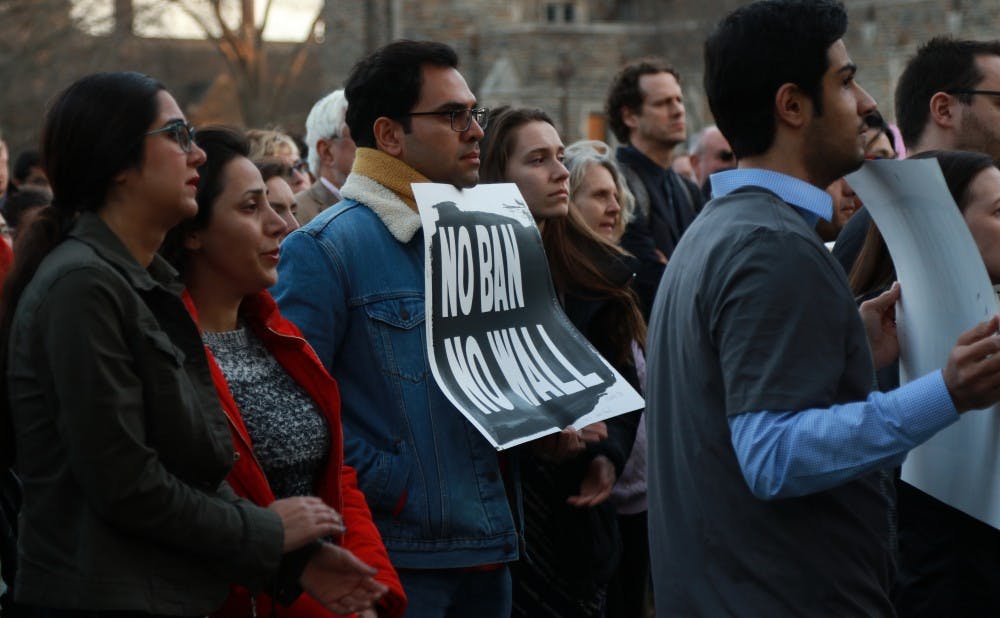I hear a lot of people at Duke say, “I’m [wealthy, or white, or straight, or male], but at least I know that makes me privileged.” And acknowledging privilege is indeed a step in the right direction, but maybe more like a baby step toward real social progress. Just knowing your privilege doesn’t do anything in itself.
It’s easy to fall in a rut of woke passivity, where one pays lip service to social issues because to not do so is socially unacceptable. But it’s hard to care about things that don’t affect you. And to say I don’t do this would be hypocritical because I am a white woman from an upper middle class family with parents who both have graduate degrees. I am not the pinnacle of privilege, but I’m up there. Do I do all I should based on what I believe about social justice? No, but if asked about most social issues I would argue for changes that demand action to be realized.
Most people who care are not intentionally hurtful to members of minorities. Yet privilege means power. Privilege means you fit the status quo, and collectively we’d much rather listen to someone who fits the status quo than someone from society’s sidelined outliers. Doors open for the privileged that don’t open for other people, and it isn’t because they’re yanking on the handle harder, it’s because it was already opened for them before they even thought about stretching out their hand. So if privilege gives one the power to make changes, and the people who suffer under the system can’t make that happen as easily, it stands to reason that privileged people should stand up when they can. If you care, you know this on some level. So why are there not more white people protesting police brutality, or cisgender people announcing their pronouns upon introduction, or men fighting for sexual equality?
Because if you don’t suffer the effects of a problem every day, you either don’t know or don’t care enough to fight its existence.
Simply knowing that you are privileged is an insufficient bandage for the guilt of being born with advantages: not wanting to seem entitled, yet lacking the motivation to do anything more substantial. Maybe your acknowledgement of privilege allows you to be more conscious in some of your actions. Maybe you call out a couple of people for saying racist or homophobic things. Maybe you convince someone of their own privilege. These are all positive actions, all tiny victories in the war that kills young black men, targets transgender individuals, robs women of bodily autonomy, and ignores the poor.
Government policy rarely leads the charge for change; it follows the tide of popular opinion. Gay marriage was not legalized when the first gay people argued for their rights—it was legalized after years of arguing. Women were not first allowed to vote when a few of them proved they were not just hysterical pieces of property in dresses—it was after years of protest. The onus of fighting for equality is left to the minority affected by discrimination, but it appears callous and slow to leave the disadvantaged to claw their way out of a system where they don’t call any of the shots.
A spot at Duke is a privilege. We didn’t all arrive here on the same footing, nor do we all have the same resources outside this campus, nor are we all seen with the same bias, but we all at least have access to the same classes and facilities. We are going to be given diplomas that grant us power just because of the name and reputation of the university on it. People are impressed when they hear where we attend college. Doors are opening for many of us as I write this.
If you know you are privileged, you know how the system works—you know whatever advantage the world granted you makes you more able to bend situations in your favor. But don’t just bend them in your favor; bend them for the people who are not heard. Stand at the protest, argue with naysayers, write politicians, fight administration, speak out for justice, vote. Inequality may not affect you every day, but the quality of the world you live in depends on your actions. If you don’t want to live in a world where people suffer needlessly, fight for them.
I write these things not because I do all of them, but because I do not. I see that it is wrong, and that I contribute to injustice with passivity. I write this column as a challenge to myself to fight for the social climate I believe is right, not just express a disinterested desire for justice. It is not enough for me to acknowledge my privilege in the second paragraph above and write this column criticizing other people when I hide beyond my MacBook screen. Acknowledging privilege is the barest of bare minimums because failing to act based off knowledge of one’s privilege takes lives and propagates inequality. A Duke-level education means we have power in the world to remediate the wrongs around us. So when I say I know I’m privileged, I should make it mean something, and so should you.
Camille Wilder is a Trinity sophomore. Her column usually runs on alternate Thursdays.
Get The Chronicle straight to your inbox
Signup for our weekly newsletter. Cancel at any time.
Camille Wilder is a Trinity first-year. Her column runs on alternate Thursdays.

